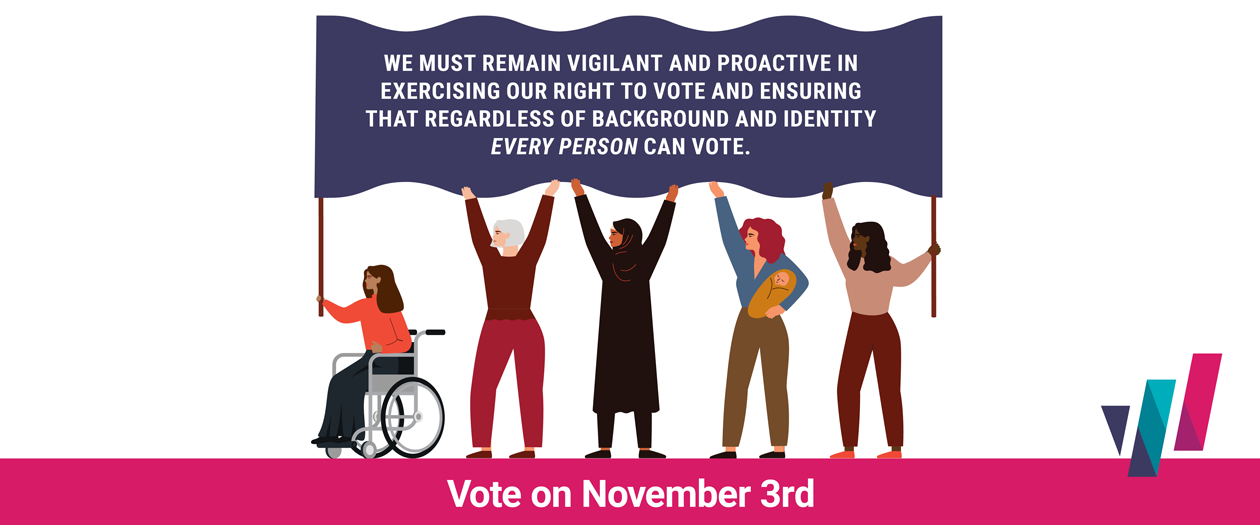The Womanifesto 2020
A Nonpartisan Ballot Guide for Everyone Who Cares About Strengthening Colorado
wo•man•i•fes•to
noun: a public proclamation of policy goals, intentions, or views, especially one issued before an election; a policy statement or platform
As a community, when we vote, we shape the future.
The Women’s Foundation of Colorado (WFCO) works for a future where women of every background, age, and identity thrive. How do we do this? As the only community foundation in our state focused exclusively on economic mobility for women, we use several strategies: WFCO informs our community through research. We translate information into action with our grantmaking partnerships. We build more equitable systems for all Colorado women through nonpartisan advocacy.
WFCO created our ballot guide, The Womanifesto, with statewide input from a diverse group of Coloradans committed to elevating opportunities for women to strengthen our state. Please keep reading and join us in improving economic outcomes for Colorado women by voting in the November 3, 2020 election.

Ballot Measures WFCO Has Taken a Position On:
| |
WFCO Position
|
Ballot Measure
|
 |
Support
|
Amendment B: Repeal The Gallagher Amendment
WFCO Position: Support
WFCO Reasoning:
Local and state budgets are strained by the unintended consequences of the Gallagher Amendment to the Colorado Constitution. Adopted in 1982 to provide homeowners relief from rapidly rising property taxes, the constitutional requirements related to property taxes ended up limiting local funding for schools and requiring the state budget to make up the difference in education funding. This leaves less money in the state budget for other priorities, including transportation, child care, housing, and other resources essential for women and families on the path to economic security.
To maintain the 45 percent residential/55 percent non-residential ratio for the property tax base required by the Gallagher Amendment, rising home values along the Front Range have pushed residential property tax assessment rates down statewide. This means that local governments collect less in property taxes and can contribute less to their school systems and other local needs, such as fire protection districts and hospitals. The state budget then must allocate more to fund education, which restricts funding for everything else, including resources essential for promoting women’s economic security. Check out this video explainer from the Colorado Fiscal Institute that explains the Gallagher Amendment and its impacts.
WFCO will continue to advocate for additional improvements to Colorado’s tax and budget policies to invest in women and a more equitable future. Repealing the Gallagher Amendment is an important step. It would not increase residential property taxes - voter approval would still be required to do so. Repealing Gallagher would stop further automatic reductions in residential property tax assessment rates that strain local and state budgets and limit investments in resources to move women forward.
Summary of Ballot Measure:
The Gallagher Amendment requires that home values make up no more than 45 percent of the state property tax base, and that nonresidential (commercial) property makes up the remaining 55 percent. This constitutional measure proposes to:
- Remove the requirement that the statewide property tax base be comprised of a constant ratio of 45 percent residential and 55 percent nonresidential property
- Repeal the requirement that the residential assessment rate be adjusted based on a mathematical formula to maintain the constant ratio
- Repeal the requirement that the assessment rate for most nonresidential property be fixed at 29 percent
Proponents:
- As a referred measure, 79 of the 100 members of the Colorado General Assembly voted in favor of it being on the ballot.
- Organizations: Colorado Coming Together, Colorado Women’s Chamber of Commerce, Denver Metro Chamber of Commerce, Special District Association
- Individuals: Former U.S. Sen. Hank Brown, Former Colorado Republican Party chairman Dick Wadhams
See Full endorsement list
Opponents:
- Organizations: Colorado Rising State Action, Keep Property Taxes Low, Protect Our Homes Colorado
- Individuals: Former state Sen. Dennis Gallagher (the namesake of the amendment), Former Speaker of the House, Dickey Lee Hullinghorst
|
 |
Support
|
Proposition EE: Taxes on Nicotine Products
WFCO Position: Support
WFCO Reasoning:
This measure establishes an early care and education system in Colorado with diverse types of providers and care that meets the needs of all types of families and children. It also addresses the harmful impact of tobacco, nicotine, and vaping on Colorado’s teens. and establishes an early care and education system in Colorado with diverse types of providers and care that meets the needs of all types of families and children. Additionally, we know that significant revenue will be needed to address the shortfall expected by the impact of COVID-19 on our economy.
Summary of Ballot Measure:
This statutory measure would raise taxes on tobacco and add a tax on nicotine vaping products for the first time. The first two and a half years of revenue would support Colorado’s economic rebuilding from COVID-19 by including funds dedicated toward education, housing, and other key initiatives that support women’s economic security. Remaining tax revenue would support tobacco and nicotine cessation initiatives and fund universal access to voluntary preschool for all children the year prior to kindergarten entry.
Proponents:
A Brighter, Healthier Future for Colorado Kids, Gov. Polis, Colorado Children’s Campaign, Children’s Hospital Colorado, Colorado Women’s Chamber of Commerce, Denver Metro Chamber of Commerce, Healthier Colorado, Save the Children Action Network
See the full list of endorsements
Opponents:
No on EE -- A Bad Deal for Colorado
See the full list of endorsements
|
 |
Oppose
|
Proposition 115: Prohibit Abortion After 22 Weeks
WFCO Position: Oppose
WFCO Reasoning:
Research clearly links a person's complete access to reproductive health to better economic security. WFCO has supported programs that fund access to family planning and opposed past ballot measures that would have impacted access to abortions. WFCO supports access to the full range of reproductive health information, care, and justice for women statewide. We believe that women have the right to decide to have or not to have children, free from stigma. This measure infringes on that right and takes away every Colorado woman’s ability to make the medical decisions that are best for her own unique circumstances. Click here to access WFCO’s full reproductive health statement.
Summary of Ballot Measure:
This statutory measure would ban abortions after 22 weeks gestation unless the pregnant woman’s life is in danger. There are no exceptions for rape. It would be a Class 1 misdemeanor to perform or attempt to perform an abortion after 22 weeks since the woman’s last menstrual period, with fines of up to $1,000. The Colorado Medical Board would be required to suspend the medical license for at least three years for health care providers who perform or attempt to perform a prohibited abortion.
Proponents:
Alliance for Life, Due Date Too Late, Coalition for Women and Children
Opponents:
Abortion Access for All, ACLU of Colorado, Cobalt (formerly NARAL Colorado), COLOR (Colorado Organization for Latina Opportunity and Reproductive Rights), Interfaith Alliance and 125 religious leaders, New Era Colorado, Planned Parenthood of the Rocky Mountains, Progress Now Colorado
See the full list of endorsements
|
 |
Oppose
|
Proposition 116: State Income Tax Rate Reduction
WFCO Position: Oppose
WFCO Reasoning:
Resources to help women overcome barriers to economic opportunity are wise investments, but this income tax reduction would limit child care, affordable housing, transportation, and other essential resources for our communities. Even before the financial crisis brought on by COVID-19, Colorado’s state budget was strained by complex interactions of several amendments to the state constitution that impact taxes and spending requirements. This article from the Colorado Sun offers a helpful explanation. This measure would reduce state General Fund revenue by an estimated $158.4 million in FY 2020-21 and nearly $170 million the following year, based on nonpartisan analysis by Legislative Council staff. A decrease in the income tax rate would require additional cuts to an already depleted state budget and further restrict investments in essential community resources for women and their families, such as child care, affordable housing, and transportation.
Summary of Ballot Measure:
This statutory measure would reduce the state income tax rate from 4.63 percent to 4.55 percent beginning with the 2020 tax year. Taxes will be reduced by $40 per year for taxpayers with an annual income of $50,000 and $80 per year for those with annual income of $100,000.
Proponents:
Americans for Prosperity, Colorado Rising State Action, The Independence Institute, Unite for Colorado
Opponents:
Many supporters of the Fair Tax Initiative (which sought to repeal the flat income tax and replace it with a graduated income tax, but did not collect enough signatures to make the 2020 ballot) oppose this initiative, Denver Metro Chamber of Commerce
|
 |
Support
|
Proposition 118: Paid Family and Medical Leave Insurance Program
WFCO Position: Support
WFCO Reasoning:
Only 17 percent of the Colorado workforce has access to paid family and medical leave and only eight percent of workers with incomes in the bottom quartile have paid family and medical leave. Access to paid family and medical leave means more women can remain in the workforce, caregiving responsibilities can be shared more equitably, more families can meet their basic needs, employers can retain talent and reduce costs, and economic activity increases. The advantages of paid leave extend to all family members.
Summary of Ballot Measure:
This statutory measure would establish a paid family and medical leave insurance program to provide partial wage replacement for up to 12 weeks of paid leave for any covered individual’s own medical needs or to care for a family member.
- Leave details:
- Beginning in 2024, up to 12 weeks of leave, with up to four additional weeks in the event of qualifying complications of pregnancy or childbirth
- Low-income workers receive 90 percent of their pay during leave
- Maximum weekly benefit is 90 percent of state average weekly wage (approximately $1,000).
- Purposes of leave include:
- Care for new child by birth, adoption, or foster care placement
- Worker’s own or family member’s serious health condition
- Qualifying exigency leave related to a family member’s active duty services or impending call or order to active duty in the armed forces
- Need for safe leave to seek protection, care, security, or legal assistance due to domestic violence, stalking, or sexual assault or abuse for the covered individual or their family member
- Leave may be used for the qualifying individual or their family, with an inclusive definition of family
- Which workers and employers are included?
- Workers are eligible after earning $2,500 in wages
- Employers are those who employ at least one individual and include state and local governments (local governments/school districts can opt out)
- Self-employed workers can opt in
- How is it paid for?
- Beginning in 2023, employers and employees split 50/50 premium contributions of 0.9 percent of employee wage
- After 2024, premium rate could be adjusted, up to a maximum of 1.2 percent of employee wage
- Employers with fewer than 10 employees are exempt from employer portion of premium
- Employers may choose to pay up to 100 percent of premium
- Employers may opt to offer private plans that meet minimum requirement
Proponents:
Colorado Families First Coalition, including Good Business Colorado, 9to5 Colorado
See the full list of endorsements
Opponents:
Colorado Women’s Chamber of Commerce, Denver Metro Chamber of Commerce, Not Now Colorado, Colorado Rising State Action
|
Other Ballot Measures:
Amendment C: Conduct of Charitable Gaming
Summary of Ballot Measure: Some nonprofit organizations use bingo games and raffles as a way to raise funds to support their organization. If passed, this amendment would decrease the number of years that a nonprofit organization would be required to operate in Colorado from five years to three years to be eligible for a charitable gaming license to conduct bingo or raffle games. It would also allow nonprofit organizations to pay an individual to manage the game.
Proponents:
- This referred measure passed out of the Colorado General Assembly with a vote of 91 to 6.
Opponents:
Amendment 76: Citizenship Qualifications of Voters
Summary of Ballot Measure: Under current law, a U.S. citizen may vote in Colorado if they are at least 18 years old, has lived in the state at least 22 days immediately prior to the election, and has registered to vote. If passed, this amendment would specify that “only a citizen” of the United States rather than “every citizen” of the United States is eligible to vote in Colorado elections.
Proponents: Colorado Citizen Voters
Opponents: Campaign for Real Election Protection, League of Women Voters, New Era Colorado
Amendment 77: Local Voter Approval of Casino Bet Limits and Games in Black Hawk, Central City, and Cripple Creek
Summary of Ballot Measure: If passed, this amendment would allow voters in Black Hawk, Central City, and Cripple Creek to increase or remove current bet limits and approve any new casino games in their city. It would also expand the current use of casino tax revenue for community colleagues to include student retention and completion programs.
Proponents: Local Choice Colorado
Opponents:
Proposition 113: Adopt Agreement to Elect U.S. President by National Popular Vote
Summary of Ballot Measure: If passed, this proposition would enter Colorado into an agreement among states to elect the President of the United States by a national popular vote once enough states join the National Popular Vote Interstate Compact.
Proponents: Coloradans for National Popular Vote, Yes on National Popular Vote, and Conservatives for Yes on National Popular Vote.
Opponents: Conservatives Vote No on National Popular Vote, Denver Metro Chamber of Commerce, Protect Colorado’s Vote
Proposition 114: Reintroduction and Management of Gray Wolves
Summary of Ballot Measure: If passed, this proposition would require the Colorado Parks and Wildlife Commission to: develop a plan to reintroduce and manage gray wolves in Colorado on designated lands west of the Colorado divide; hold statewide hearings about scientific, economic, and social considerations; periodically obtain public input to update the plan; and use state funds to assist livestock wonder in preventing conflicts with gray wolves and pay fair compensation for livestock losses.
Proponents: Colorado Sierra Club - Elect the Wolf, Rocky Mountain Wolf Action Fund
Opponents: Coloradans Defending Our Wildlife, Coloradans Protecting Wildlife, Denver Metro Chamber of Commerce
Proposition 117: Voter Approval for Certain New State Enterprises
Summary of Ballot Measure: If it passes, this proposition would require that voters approve any new state government-owned businesses, called enterprises, if the enterprises’ revenue from fees over its first five years exceeds $100 million.
Proponents: Americans for Prosperity Colorado, Voter Approval of Fees
Opponents: Denver Metro Chamber of Commerce, Earthworks Action Fund, Protect Colorado’s Recovery
Other Voting Resources
- The “blue book” is created by the Colorado General Assembly Legislative nonpartisan legislative council staff and overseen by a bipartisan committee of members of the Colorado General Assembly. It provides information on the statewide measures on your ballot and the judges who are on the ballot in your area. Every voter should receive both an English and Spanish version via mail. It can also be found here
- Many online newspapers, print newspapers, magazines, radio stations, and tv stations create ballot guides. If you visit their website you can find them.
- Similar to WFCO, nonprofit organizations, associations, and other entities also produce ballot guides.
- Several WFCO grantees have recently released ballot guides as well:
Thank you to all of The Womanifesto reviewers!
A diverse and representative group of approximately 60 individuals from across Colorado contributed their perspective and expertise to help create The Womanifesto 2020 Ballot Guide. Thank you for sharing your time and talent with WFCO to strengthen all of Colorado!
